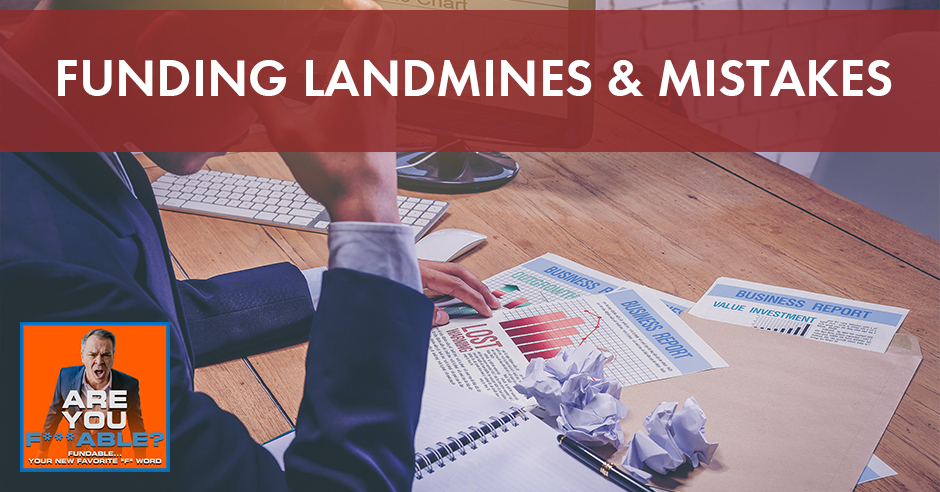
—
Watch the episode here:
Listen to the podcast here:
Funding Landmines & Mistakes
We’re going to be discussing the eight most common, most frequent fatal funding mistakes that real estate investors, business owners and all entrepreneurs make and don’t even know you’re doing it. First things first, let’s stop failing and then we can work on building the appropriate fundable profile. We can look at our borrower data. We can look at our performance behavior in every one of the metrics that FICO and underwriter systems measure. We’ve got to stop stepping into landmines. I’m going to do a countdown in this. We may have alluded to some, alluded to others because it’s so interconnected and there are so many moving parts.
Not Having The Right Business Address
Have you seen the performers on stage where they’re running along trying to keep all the plates spinning? Unless you know what you’re doing, having a borrower profile that is even remotely meaningful to a lender is just that complicated. The second you know the rules of the game, the second you know what you’re doing, it is so simple. Let’s get into these fatal funding errors or landmines. I haven’t met anybody who hasn’t blown something up in their fundability™ by stepping on one of these fatal funding mistakes. Let’s countdown from eight down to one. Number eight is not having the right business address.
We’re talking about the business side of things, the business funding side. Unless you’re in one of those remote areas of the United States where a post office box or commercial mailbox like UPS is the only place that you can receive mail, you’re okay. Everywhere else in the United States, if your business address is your residence, you’re going to be denied or you’re going to be approved for little tiny baby amounts. If your business address is at a post office box, you’re going to get denied. Your approvals are going to be test approvals. They’re going to say, “Let’s give them a couple of grand and see what they do.” You can’t do anything with a couple of grand.
You have to shape your personal profile to meet business lender guidelines. When you don't, you're killing it #GetFundable Share on XWe want to be able to get a $50,000 business line of credit, write a check and do a deal. We want ten of those accounts for $500,000 or $100,000 from each bank. That’s what the million-dollar funding formula is all about. You can’t even get there with anything more than a test approval until you have the right business address. The closer you are to brick and mortar, literally the better you are when it comes to having a professional business address, not a mailbox, not a post office box, and not your residence. There are secrets to all of this, which you’re going to learn by going to GetFundable.com. Check out the Bootcamp. Check out the rest of this show and keep bingeing. We will reveal it all. The bottom line is that you need to have the right business address or you get an automatic denial. That denial comes right out of the automatic underwriting systems because they reject those addresses out of hand.
Thinking You Can’t Qualify Because You Can’t Go Full Doc
Number seven is thinking you can’t qualify because you can’t go full doc. Many people come to me. This is outrageous and I don’t know why other educators are not jumping up and down on the rooftop screaming this out. I’m the only one. Most people don’t even apply because they don’t believe they can go full doc. Do you know what full documentation represents? It’s your tax returns. Do you know what lenders look at in your tax returns? Your top–line revenue for the business. I know as an American citizen, it’s your duty to minimize taxes, but lenders don’t look at the bottom line. People come to me all the time, “I did $2 million in sales, but I write everything off and I only did $8,000 in income.” The lenders want to know what your top line is. That’s a landmine. You keep blowing up because you don’t know what they’re measuring. They want your top line and many times the lenders will lend 10% to 15% in an unsecured business line of credit up to $100,000 based on your top line. It thinks you can’t qualify because you can’t go full doc. Going full doc isn’t the worst thing in the world, but make sure you know what they’re looking for.
The other thing is you can’t go full doc because you think that you can’t qualify for stated income. Remember what I’ve said in other episodes, full doc means they’re looking to prove what you put on your application. If you don’t have to prove what’s on your application, you know what the performance data they’re measuring and the borrower behavior they’re measuring, you don’t even need a full doc, but you fail. The funding error is thinking you have to go full doc when you don’t have to if you’ve done the right things. If you do go full doc, know that they’re looking at the top line rather than the bottom line of your taxes and your financials. I don’t understand why we don’t know this. That’s why it took me years to even come to the awareness that I needed to do this show because I thought I knew everybody didn’t know everything, but I thought there were some common things that people knew. We don’t know anything. Most people don’t know most things.
Thinking You Know What Underwriters are Looking For
Number six, thinking you know what underwriters are looking for. We talked about full doc, but you don’t even know what an underwriter is looking for. If you think they’re looking for credit score, we already said they’re not looking for a credit score. If you think they’re looking for income alone or income amount, no, they’re not looking for income. They’re looking for your relationship between income and your debts. You can still get qualified if you have the right ratios. All of these have insider secrets. Every one of these of fatal funding mistakes or landmines has a way to avoid it. Underwriters, there are 40 characteristics. You may be hefty and powerful in some of the metrics and you don’t even know they’re being measured. You’ve got to know the rules of the name.

Funding Mistakes: A funding error is thinking you have to go full doc when you don’t have to.
Having The Wrong Business Type For Funding
Let’s talk about number five, having the wrong business type for funding. There’s going to be an entire episode on this topic alone. What do we mean by business type? There is what’s called SIC codes, Standard Industrial Classification codes. That’s the older version. There’s what’s now called the NAICS codes. It’s the National Industrial Classification System. These are numbers that are put next to Dun & Bradstreet on your credit applications or on your account information that says that you’re a type of business. Different types of business have different levels of fundability™.
We have a show that talks about the Paydex score. When Brad and I were back at the first FICO World, we asked certain questions to the FICO score development team. They go, “We don’t have the answers to that. Go talk to the folks over at Dun & Bradstreet.” They had a kiosk there and we went over and asked, “Could you give us a list of the most fundable businesses?” They said, “We can’t give you the list from most fundable to least fundable, but we can give you percentages of what has been funded, what approvals come with these types of industry.” That’s a gold mine.
If you have the wrong type of business, you’re going to be rejected out of hand, but there are ways. There are asset protection mechanisms, there are insider secrets to all of this. There is a way to set up your business. It doesn’t matter if you own gyms or you’re an aesthetician or a race car driver. It does not matter how you make your living. If you’re a business owner, entrepreneur, real estate investor, whatever you’re doing, you can establish a business model that is fundable and can fund all of your activities, all your deals and all the things you want to do in your professional life. They’re all available. You have to know what is the fundable entity is or how to convert your company into a fundable entity form. There are insider secrets to all of these.
If you do the right things on your personal profile, it turns that personal profile into a business funding machine #GetFundable Share on XGetting Denied Because Of The Application Score
The fourth most fatal funding mistake real estate investors, entrepreneurs and business owners make are getting denied because of the application score. Application score is a FICO score that has nothing to do with your credit and everything to do with comparing the data you put on your application, comparing it to the data that is in the credit bureaus, the early warning systems, Falcon and the other databases they check your data points against. If you don’t know what’s being reported about you, how do you know what to put on your credit application? The credit application is measured against the data. If you have too high of a difference between that data, FICO’s application score gives a score to the underwriting software and says, “These guys are worth denying.”
You don’t even know that the application score exists. You don’t know that what you’re putting on your credit app is even meaningful. I’ve had clients who’ve come in and I say, “What did you put on your last credit app?” They said, “I made $10,000 a month.” That’s $120,000 a year. That’s what you put in your application.” They said, “Sometimes I get bonuses. On one credit application, I think I put $13,000.” I’m like, “Do you realize that if you filed two applications within X period of time, it differs by profile and it’s $3,000 difference, you’re going to get rejected because it looks fraudulent. Somebody is just guessing at how much money you make.”
The client or the student says invariably, “Yes, but I’m just telling the truth.” I’m going, “Yes, you’re telling the truth, but whoever has the most documentation wins.” That’s how our legal system works. That’s how our financial system works. Whoever has the most proof wins. It doesn’t matter if you made $10,000 one month and $13,000 the next month. If you don’t know what FICO and the underwriting software is measuring, they’re going to reject your application even though you’re making more money. They’re trying to protect against fraud more than they’re trying to prove you, the one borrower. You, the one borrower is worth X to them. You could be worth losses to them if they don’t protect against that fraud.
You’ve got to establish what the databases have and fill out an application to match exactly what the databases have or in reverse, establish the truth of your situation, your fundability™ and then make sure all the databases have it. The application score will get you rejected out of hand and you don’t even know that an application score exists. You got to make sure that you’re not just telling the truth. You’re telling a truth that is acceptable. If you put down $11,000 instead of $10,000 on the application, you probably would have been approved. Is it a lie? Yes, but we are airing on being conservative. Lenders don’t care if you downplay how much you make, they don’t want you picking some random number and funding on that random number.

Funding Mistakes: Fake business credit is saying business on the credit card, statement, or marketing but actually reports to your personal profile.
$11,000 would’ve probably been approved. $13,000 was too far of a stretch for the application score to reconcile the data points against what the client put on the application. There are tolerances and there are insider secrets to all of these. There are insider secrets to all of these and you’re going to learn every single one of them. If you’re loving this, then make sure you comment. Let people know. People who haven’t taken the time yet to invest in their fundability™, let them know that it’s worth beginning this journey and let them join us on bingeing away. Thank you for that. If you like what we’re doing, if you like how I am pulling back the curtain, if you like how I’m revealing the things that are possible for your fundability™, I’m doing you a solid. You do other newbies a solid. Let them know that it’s safe to at least try and explore this possibility.
Chasing Fake Business Credit
Let’s look at number three, chasing fake business credit that destroys your fundability™. We do have an entire episode that’s on the docket and we’re going to go through fake business credit offers. There is a way to know exactly what is fake and what is not. Fake business credit is a credit that says business on the credit card, business on the statement, business on the marketing, but reports to your profile. If it reports to your personal profile and you use it for your business, your utilization goes up, your balance goes up and your fundability™ and future approvals go down. You can’t get fake business credit. Since nobody knows this, everybody keeps investing. A perfect example, there is not a single credit card offered by Capital One that doesn’t report to your personal profile. The Spark card and there’s a couple of others, any of those reports on your personal profile and every time you use it ruins your fundability™.
In one of the previous episodes, I said one of the ways to be unfundable is to have too much available credit. Here’s the thing. You can have too much available credit on the personal side, but you cannot have too much available credit on the business side. Here you think you go to Capital One in good faith, it says business credit and then they report to your personal and it increases your available credit on personal. Every time you use it for your business, it ends up hurting your utilization. It kills the goose that lays the golden egg. We have to stop chasing the fake business credit offers and establish true business credit.
The best way for you to improve your fundability™ is to stop blowing it up #GetFundable Share on XThinking You Are The Deals That You Do
We do have another episode to this one but notice we’re already spending so much time together. I want to go over the highlights in this episode so that when we start establishing it, you know the context. You know where I’m coming from. I don’t have to explain myself all over again. The number two most fatal funding mistakes almost every real estate investor, entrepreneur and business owner makes is thinking you are the types of deals you do. You’re thinking, “I’m a real estate investor.” No, you’re not. You’re a businessman or businesswoman who has chosen to exercise your talents and skills in real estate investing. You are not a note buyer or a gym owner. These are subtle.
You are a genius behind the business and you’re expressing yourself through the business. It sounds like I’m splitting hairs. If I’m splitting hairs, so are the lenders because lenders will not lend to your deals. You may have already discovered they won’t lend to real estate investors, to note buyers, to dozens of types of businesses because those businesses are not fundable, you are. If you believe you are the deals you do, if you believe you are a real estate investor rather than the genius behind it, you’re never going to get funded. If you know the insider secret on how to separate you as the fundable entity from your deals, I will show you how to get funded.
Killing Your Funding
The single number one biggest, ugliest land mine, funding mistake, funding error that business owners, real estate investors, and entrepreneurs make is killing your funding golden goose and you don’t even know what it is. You don’t know what your golden goose is and you don’t know how you’re killing it. It’s so cliché out there now. Everybody says you don’t know what you don’t know. You have no clue what your golden goose is and why you’re killing it. Your golden goose is your qualified borrower profile, not your business. Your business is secondary even to business lending. Some of that is represented on your credit profile as reported by the bureaus and scored by FICO. That is responsible. The FICO business liaison told me personally that 80% of all business lending decisions for small and entrepreneurial businesses depends on your qualified personal profile, a personal credit profile that reflects business lender guidelines. We have to shape your personal profile to meet those business lender guidelines. When you don’t, you’re killing the goose that lays the golden egg.
Let’s go through every one of these funding mistakes. If your business address is at your home, you’re confusing the algorithm and they’re downgrading your fundability™ because you can’t have your business at your home address and be fundable. The personal profile has to have a distinct residential address it’s depending on. The business address has to be separate. Number seven, you can’t qualify because you can’t go full doc. If you know what they’re measuring, you could get qualified, but what are they measuring? FICO business liaison Dave Smith told me that business credit reporting now is what personal credit reporting was in the mid–‘80s. They can’t look at trade lines on business credit.

Funding Mistakes: Your personal profile is the golden goose. No lender is going to deny you when you are taking care of the goose that lays the golden egg.
They have to look at how you treat lender money on your profile, not on a business profile. When you don’t go full doc, they measure your profile. The goose that lays the golden eggs is the personal profile. They’re looking at how you treat that lender money, your credit cards, your auto loans, your mortgages. They measure all of that, but it’s all on your personal. If you don’t do it right, you’re killing the golden goose. It’s having the wrong business type for funding, getting denied because of the application score, chasing fake business credit. If you put fake business credit on your profile, you will ruin your profile.
First of all, you got to understand that your profile is the golden goose. If you treat it right, keep it healthy, do the right things that lenders are measuring, it’s going to lay forever the golden eggs of business lines of credit business, true business credit cards, commercial loans, real estate loans, blanket loans. You’re going to get the best rates on homes and auto loans, business credit cards and personal credit cards. Whatever your funding goals are, you’re going to get the very best possible. No lenders are going to deny you because you are taking care of this goose that lays the golden egg.
If you do the right things on your profile, that personal profile becomes a business funding machine. I’m passionate about this. There’s no reason that once you read this, we can stop stepping on the landmines. The best way for us to improve our fundability™ is to stop blowing it up. These eight areas are insanely easy ways to stop blowing up our fundability™. Continue to read this blog, drive time magic. For those of you who are working out magic, make sure that you know the rules of this game and I will see you in the next episode.




